
The Haflinger is a small, lightweight, four wheel drive, high mobility cab over vehicle about 2.8 m long and 1.3 m wide, powered by a 643 cc horizontally opposed flat twin, rear mounted air-cooled engine. Weighing around 635 kg (1400 lb), the Haflinger can be lifted by four strong people and yet can carry a load of 515 kg (1135.3 lb). This truck falls into the category of the light utility vehicle. It was produced between 1959 and 1974 by the Austrian manufacturer Steyr-Daimler-Puch.

Tatra is a Czech vehicle manufacturer from Kopřivnice. It is owned by the TATRA TRUCKS a.s. company, and it is the third oldest company in the world producing motor vehicles with an unbroken history. The company was founded in 1850 as Ignatz Schustala & Cie. In 1890 the company became a joint-stock company and was renamed the Nesselsdorfer Wagenbau-Fabriksgesellschaft. In 1897, the Nesselsdorfer Wagenbau-Fabriksgesellschaft produced the Präsident, which was the first factory-produced automobile with a petrol engine to be made in Central and Eastern Europe. The First Truck was made a year later, in 1898. In 1918, the company was renamed Kopřivnická vozovka a.s., and in 1919 it changed from the Nesselsdorfer marque to the Tatra badge, named after the nearby Tatra Mountains on the Czechoslovak-Polish border.

The Volkswagen Type 82 Kübelwagen, or simply Kübel, contractions of the original German word Kübelsitzwagen, is a military light utility vehicle designed by Ferdinand Porsche and built by Volkswagen during World War II for use by the Nazi German military. Based heavily on the Volkswagen Beetle, it was prototyped and first deployed in Poland as the Type 62, but following improvements entered full-scale production as the Type 82. Several derivative models, such as the Kommandeurswagen, were also built in hundreds, or in dozens.
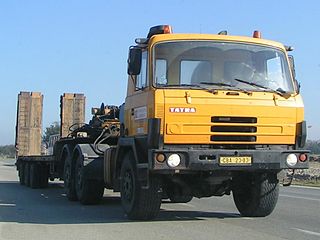
The Tatra 815 is a truck family, produced by Czech company Tatra. It uses the traditional Tatra concept of rigid backbone tube and swinging half-axles giving independent suspension. The vehicles are available in 4x4, 6x6, 8x8, 10x8, 10x10, 12x8 and 12x12 variants. There are both air-cooled and liquid-cooled engines available with power ranging from 230–440 kilowatts (310–590 hp). As a successor to Tatra 813 it was originally designed for extreme off-road conditions, while nowadays there are also variants designated for mixed use. The gross weight is up to 35,500 kg (78,264 lb).

Avia Motors s.r.o. is a Czech automotive manufacturer. Founded in 1919 as an aircraft maker, it diversified into trucks after 1945. As an aircraft maker it was notable for producing biplane fighter aircraft, especially the B-534. Avia ceased aircraft production in 1963.

Six-wheel drive is an all-wheel drive drivetrain configuration of three axles with at least two wheels on each axle capable of being driven simultaneously by the vehicle's engine. Unlike four-wheel drive drivetrains, the configuration is largely confined to heavy-duty off-road and military vehicles, such as all-terrain vehicles, armored vehicles, and prime movers.

The Diamond T Company was an American automobile and truck manufacturer. They produced commercial and military trucks.
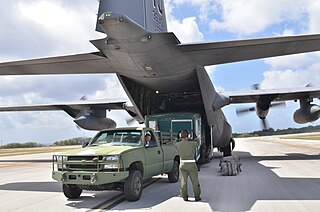
The Commercial Utility Cargo Vehicle, later the Light Service Support Vehicle (LSSV), is a vehicle program instituted to provide the United States military with light utility vehicles based on a civilian truck chassis.

The TatraT813 was a truck produced in Czechoslovakia by the Tatra company. It was produced from 1967 to 1982. The basic representative of this series was a military version of the 8×8 Kolos (Colossus), which was able to pull trailers up to a total weight of 100 tons. Tatra also produced a civilian version in either 6×6 or 4×4. After fifteen years of production, 11,751 vehicles were built in all modifications. Many units were exported to the USSR, East Germany, Romania and India.

The Tatra 148 was a truck produced in Czechoslovakia by the Tatra company.
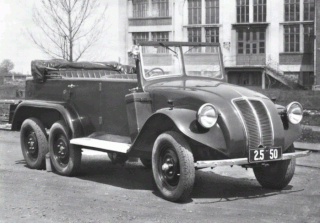
The Tatra 82 was a heavy-duty car model made by Czech manufacturer Tatra between 1935 and 1938. It was mainly used for military cargo and personnel.

The Tatra 12 is an automobile produced by Czech manufacturer Tatra between 1926 and 1933. It was replaced by the Tatra 57 in 1932.

The Tatra 26 is a vintage 6x4 automobile produced by the Czech manufacturer Tatra in the late 1920s and early 1930s. It was developed on the basis of the T 12. However, tests showed that the engine from T 12 did not have enough power, and it was replaced by the Tatra 30 engine. The car had extreme off-road abilities - reportedly it was even able to climb staircases.

The Dodge WC series is a prolific range of light 4WD and medium 6WD military utility trucks, produced by Chrysler under the Dodge and Fargo marques during World War II. Together with the 1⁄4-ton jeeps produced by Willys and Ford, the Dodge 1⁄2‑ton G-505 and 3⁄4‑ton G-502 trucks made up nearly all of the light 4WD trucks supplied to the U.S. military in WWII – with Dodge contributing some 337,500 4WD units.
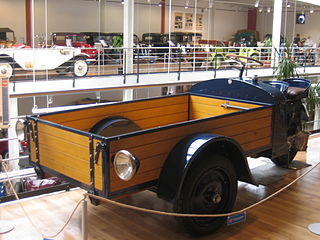
The Tatra 49 is a model of vintage three-wheeled motor vehicle made by Czech manufacturer Tatra.
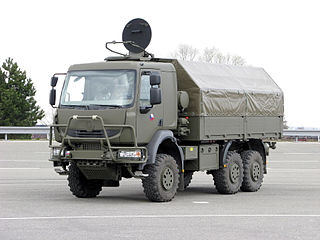
The Tatra T 810 (Tactic) is a medium truck made by Czech company Tatra; it replaced the popular Praga V3S which was introduced in the 1950s and served in the Army of the Czech Republic until 2008. Unlike other Tatra trucks, it does not use classic Tatra air-cooled engine and the traditional Tatra conception of backbone chassis and swinging half-axles, but the customary truck architecture with conventional frame. It is mainly intended for difficult terrain conditions. The civilian version T 810-C was introduced in 2010.
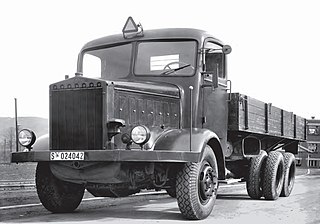
The Tatra 81 was heavy-duty truck model made by Czech manufacturer Tatra between 1940 and 1942. The development was ordered by German government in the aftermath of the German occupation of Czechoslovakia in 1939 and was complete the same year. It was mainly used in Germany by Ordnungspolizei, but few were utilized by Wehrmacht to ferry supplies.

The Tatra 72 was an army off-road truck model made by Czech manufacturer Tatra between 1933 and 1937. It was mainly used for transporting military cargo, personnel and towing artillery pieces in Czech and later German armies. The design was also license-built in France by Lorraine-Dietrich, as the Lorraine 72.

The Praga RV was an army off-road truck model made by Czech manufacturer Praga between 1935 and 1939. It was mainly used for transporting military cargo, personnel, as ambulance and for towing artillery pieces in Czech and later German and Romanian armies. 3290 vehicles were slated for use in Czechoslovakia while the rest was exported to Iran, Peru, Poland, Sweden, Switzerland and Turkey.
Vehicle weight is a measurement of wheeled motor vehicles; either an actual measured weight of the vehicle under defined conditions or a gross weight rating for its weight carrying capacity.




















